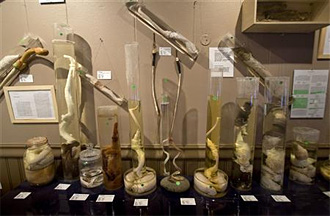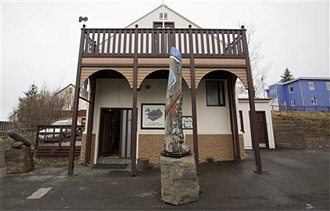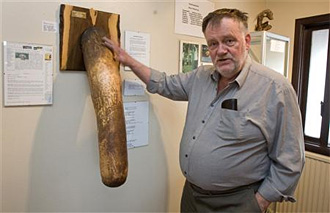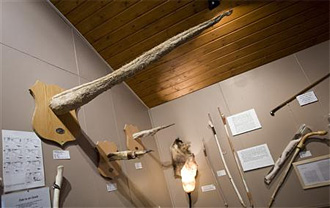
|
 |
 |
 Americas & Beyond | May 2008 Americas & Beyond | May 2008  
Icelandic Museum Offers Long and Short of Male Organ
 Bob Strong - Reuters Bob Strong - Reuters
go to original


| | Jars filled with various animal phalli are on display at the Icelandic Phallological Museum in Husavik May 8, 2008. (Reuters/Bob Strong) | 
| | A large wooden phallic sculpture stands outside the Icelandic Phallological Museum in Husavik May 8, 2008. (Reuters/Bob Strong) | 
| | Sigurdur Hjartarson, owner and founder of the Icelandic Phallological Museum, poses next to a stuffed elephant penis at the museum in Husavik May 8, 2008. (Reuters/Bob Strong) | 
| | A dried blue whale penis (L) is mounted and displayed at the Icelandic Phallological Museum in Husavik May 8, 2008. (Reuters/Bob Strong) | | |
Husavik, Iceland - Sigurdur Hjartarson is missing a human penis. But he's not worried: four men have promised to donate theirs to him when they die.

Hjartarson is founder and owner of the Icelandic Phallological Museum, which offers visitors from around the world a close-up look at the long and the short of the male reproductive organ.

His collection, which began in 1974 with a single bull's penis that looked something like a riding crop, now boasts 261 preserved members from 90 species.

The largest, from a sperm whale, is 70 kg (154 lb) and 1.7 meters (5.58 ft) long. The smallest, a hamster penis bone, is just 2 mm and must be viewed through a magnifying glass.

One species conspicuous by its absence is homo sapiens, but that may soon be rectified since a German, an American, an Icelander and a Briton have promised to donate their organs after death, according to certificates on display.

The American, 52-year-old Stan Underwood, supplied a written description of his penis - which he purportedly nick-named "Elmo" - for display alongside a life-size plastic mould of the member as well as his pledge to donate it.

Hjartarson said the Icelandic donor, a 93-year-old from nearby Akureyri, was a womanizer in his youth who thought having his penis in the collection might bring him eternal fame.

But vanity may make him rethink the offer.

"He has mentioned lately that his penis is shrinking as he gets older and he is worried it might not make a proper exhibit," Hjartarson said.

WOMEN VISITORS

The museum, originally opened in Reykjavik in 1997, has now moved to the quiet fishing village of Husavik, 480 km (298 miles) northeast of the capital.

Open from May to September, it is housed in a plain brown building, the entrance marked by a tall brown phallus near the door and a penis-shaped sign over the front porch.

A growing number of people from all over the world view the collection each year, 60 percent of them women.

"We had 6,000 visitors last summer and actually made a profit," Hjartarson said with a smile.

The specimens, most of which were donated by fishermen, hunters and biologists, are kept in glass jars of formaldehyde or dried and mounted on the wall, creating an atmosphere that is part science lab, part trophy room.

Hjartarson has paid for only one - an elephant penis nearly 1 meter long that hangs, stuffed and mounted on a wooden board, in the museum's "foreign section."

He said he began collecting penises 24 years ago, when working as a school administrator, with little notion he would one day be running a museum devoted to the subject.

"It was just a hobby," he said, adding that the collection was relegated to his office until the inception of the museum.

"They were not on display in the sitting room."

The museum's "folklore collection" includes a few sculptures and joke items, but no sex toys or paraphernalia. The more risque displays stay under wraps.

"Two elderly German women came in a while ago and after viewing the exhibit, they scolded me for displaying a group of figurines in Kama Sutra poses, so I put them in here," Hjartarson said, lifting a black cloth off a glass-topped box labeled 'Erotica'.

"This way nobody has to view them unless they want to."

Hjartarson maintains a light-hearted approach to his delicate subject matter, saying a sense of humor and a bit of intelligence are necessary to appreciate the collection.

"I hope visitors leave the museum in a better mood than when they arrived," he said.

(Editing by Sarah Edmonds and Sara Ledwith) | 
 | |
 |



